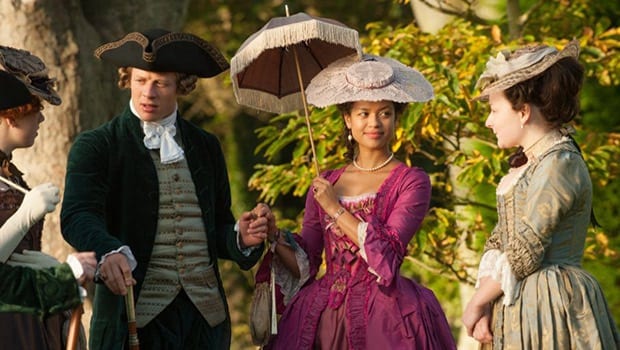‘Belle’ misses chance to examine historic event in battle against British slavery


In “Belle,” Gugu Mbatha-Raw (l) stars as Dido Belle, who falls in love with abolitionist John Davinier, played by Sam Reid (r). The pair unite to oppose slavery in 18th century England.
Worlds seem to collide in “Belle,” which is the latest in a series of movies about slavery released to American audiences in recent years.
Cinematic offerings like “12 Years A Slave,” “Django Unchained” and “Lincoln” compare somewhat to “Belle” thematically, covering a similar story line: evil whites persecute blacks but somehow — through wits, or human perseverance the slave finds a way to freedom.
Where these films differ is how they reach their destination, as “Belle” is a movie which is, unfortunately in this case, mostly about romance — only half-heartedly focusing on the momentous subject matter upon which it is historically based.
“Belle,” a 2013 British drama, was presented at a special screening at The Museum of Fine Arts as part of a collaboration between the Museum for African-American History, WCVB TV’s “Cityline” and Color of Film Collaborative. It will be released nationwide this week.
The setting is 18th century England where a legal debate boils about the insurance value of 142 slaves who were murderously dumped into the Atlantic Ocean on their way to servitude in the New World. The commanders of the HMS Zong claimed the slaves were diseased — damaged goods they were forced to dispose of during their oceanic passage. The owners of the ship sought through the British high court the premium coverage of their “cargo” of humans.
Against a plotline so important, “Belle,” written by Misan Sagay and directed by Amma Asante, fails terrifically as the film’s protagonist Dido Belle (Gugu Mbatha-Raw) is portrayed mostly as love-thirsty rather than as a heroic figure striving in momentous times as England approaches the end of slavery.
Here is how the story goes: Dido is the “illegitimate” daughter of a British Admiral officer, John Lindsay, (Matthew Goode) and an African slave woman, Maria Bell, who dies when Dido is about six years old. After leaving the orphaned child with his uncle, Lord Mansfield, (Tom Wilkinson) and Lady Mansfield (Emily Watson) to raise, Dido’s father also dies.
Dido, raised with her cousin, Elizabeth Murray (Sarah Gadon,) inherits a fortune and is reared into adulthood by her uncle among the British aristocracy. Belle’s surrogate father also happens to be the equivalent of the chief justice of the U.S. Supreme Court.
Dido eventually falls in love with a “commoner” abolitionist, John Davinier (Sam Reid). They both eventually convince Lord Mansfield to oppose slavery and rule against the slaver suing for damages.
The worlds that collide are slavery, gender and class as they briefly surface enough for the audience to just absorb them in all of their weightiness. In the end, issues sublimate to tissue paper treatment in favor of a love story, which in some other movie would be welcomed, but not in this one.
The cost of downplaying the tragic history of slavery is disappointment. Unfortunately, this film favors soap opera over historical realities.
There is so much more to say about how race, gender and class meet — particularly as England and its American colonies were struggling with slavery — but “Belle” avoids that intersection in favor of a sentimental love story.

![Banner [Virtual] Art Gallery](https://baystatebanner.com/wp-content/uploads/2024/05/PFW_3-150x150.jpg)


![Banner [Virtual] Art Gallery](https://baystatebanner.com/wp-content/uploads/2024/05/PFW_3-848x567.jpg)

